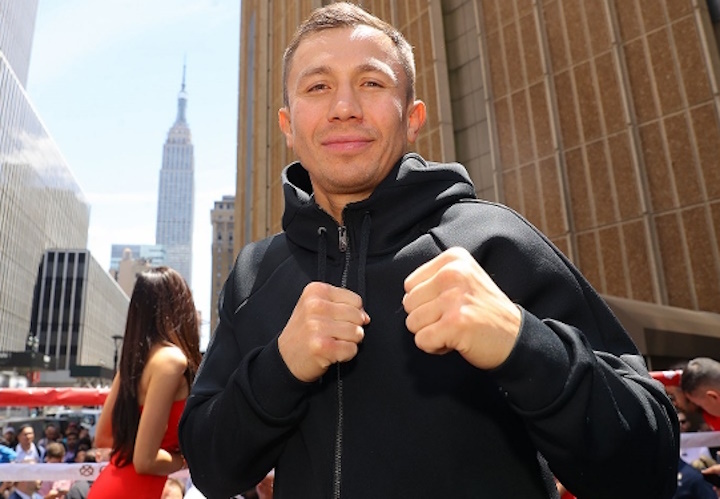Gennady Golovkin may or may not be retired from the ring. He hasn't completely ruled out returning at the right time, but he's not done fighting. His latest challenge, however, isn't to beat an inferior middleweight, but to fight to keep boxing in the Olympic Games. With Paris 2024 fast approaching, Golovkin, an Olympian himself and the new president of Kazakhstan's National Olympic Committee, is hoping he can use his experience and status to ensure boxing is still part of the action when the Olympic circus comes to Los Angeles in 2028.
“I've never announced my retirement and it's not in my nature to announce it out loud,” the former middleweight champion said through a translator in a recent interview with Boxing Scene. “So, only time will tell. Right now I have this job and I love what I do. At the same time, for me, life is movement. And if a big challenge comes along and I see that it's a good way to change gears, a good way to recalibrate my path and my movement, then maybe I'll accept this challenge and then maybe we'll fight again.”
Following his 2022 decision loss to Saul “Canelo” Alvarez, the future Hall of Famer admitted he had begun to significantly reduce his physical activity when the opportunity to pursue a new position arose.
“I didn't offer it to them, they didn't approach me directly,” he said when asked how he ended up taking the new job. “It was just a series of events and the fact that I was scaling back my professional career. I stopped training every day and I had more free time in my life. I'm interested in sport in general. Sport is very close to me and for me it's an opportunity to contribute to the development of sport in my country. I'm an athlete and I'm for athletes. I'm not a bureaucrat or a politician. I'm for the people, for the athletes. And when the elections for the president of the National Olympic Committee came up, I agreed to take part and that's how I was elected.”
His job will be to study and support all Kazakhstan's Olympic athletes, a role he says he welcomes because “as an athlete myself, I believe our athletes should be in a better position.” But while Golovkin was renowned for his relentless aggression as a professional boxer, he was less forthright when it came to the biggest problem facing Olympic athletes.
“We need to fight corruption,” he said generally, “and eliminate the opportunities for corruption, make it impossible. I'm not talking about specific countries, I'm saying this is a universal problem.”
Few sports are as closely associated with corruption as boxing, but even the cesspit of professional boxing has to bow to the filthy filth of amateur boxing. The International Olympic Committee (IOC) has revoked recognition of the International Boxing Association (IBA) as boxing's international federation, leaving the sport without long-term governance. Boxing at the Paris Games will be organised by the IOC itself, but the committee has made it clear that is not a sustainable solution beyond this summer. Amateur boxing in some countries, including Britain and the United States, has set up an organisation called World Boxing to replace the IBA, but Golovkin did not respond when asked if he would encourage Kazakhstan to join.
“The solution is for all countries to come together, talk and find a solution on how to keep boxing as part of the Olympic sport,” he said.
He seems more comfortable sharing his personal feelings about the turmoil that Olympic boxing has found itself in.
“I'm upset,” he confessed, “and sad. And I find this situation unacceptable. And not because I'm a boxer, but because boxing is one of the most popular sports in the world. It's very difficult to imagine the Olympics without boxing. So we need to do everything possible to keep boxing as part of the Olympic program. I think it's important to keep it because it gives boxers a jump start. It gives them the opportunity to continue their professional career after finishing their amateur career. So boxing must be part of the Olympics.”
Golovkin will be in Paris to meet with other national committee chiefs to discuss ways to keep tennis in the Olympics.
“We have a very clear plan that we can use to get results and find solutions,” he said cryptically, describing the Olympic agenda.
Since the modern Olympics began, the Olympics have been influenced as much by external factors as by the sport itself: think Jesse Owens in Berlin in 1936, the massacre of Israeli athletes in Munich in 1972, the successive boycotts in 1976, 1980 and 1984, or the global pandemic that derailed the 2020 Tokyo Games and ultimately forced a one-year postponement. But Golovkin, who won a silver medal in Athens in 2004, is urging athletes attending the Paris Games to rise above the noise and embrace the Olympic spirit.
“You can't put results above integrity, honesty and pride,” he said. “No matter what happens, you have to be a person of integrity and avoid selling yourself out at all costs.”
At the same time, he encourages his students to savor every moment.
“It's an amazing experience,” he said. “The opening ceremony, the closing ceremony, and especially winning a medal and becoming a champion. So, more than anything, I would say, enjoy it.”
Kieran Mulvaney has written, broadcast and podcasted about boxing for HBO, Showtime, ESPN and Reuters. He also writes regularly for National Geographic and has written several books about the Arctic and Antarctic. He is happiest spending time with polar bears in the wild. His website is www.kieranmulvaney.com.

